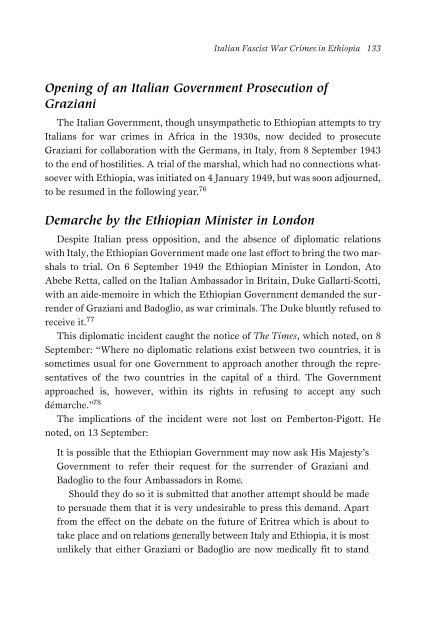Italian Fascist War Crimes in Ethiopia - Societa italiana di storia ...
Italian Fascist War Crimes in Ethiopia - Societa italiana di storia ...
Italian Fascist War Crimes in Ethiopia - Societa italiana di storia ...
Create successful ePaper yourself
Turn your PDF publications into a flip-book with our unique Google optimized e-Paper software.
<strong>Italian</strong> <strong>Fascist</strong> <strong>War</strong> <strong>Crimes</strong> <strong>in</strong> <strong>Ethiopia</strong> 133<br />
Open<strong>in</strong>g of an <strong>Italian</strong> Government Prosecution of<br />
Graziani<br />
The <strong>Italian</strong> Government, though unsympathetic to <strong>Ethiopia</strong>n attempts to try<br />
<strong>Italian</strong>s for war crimes <strong>in</strong> Africa <strong>in</strong> the 1930s, now decided to prosecute<br />
Graziani for collaboration with the Germans, <strong>in</strong> Italy, from 8 September 1943<br />
to the end of hostilities. A trial of the marshal, which had no connections whatsoever<br />
with <strong>Ethiopia</strong>, was <strong>in</strong>itiated on 4 January 1949, but was soon adjourned,<br />
to be resumed <strong>in</strong> the follow<strong>in</strong>g year. 76<br />
Demarche by the <strong>Ethiopia</strong>n M<strong>in</strong>ister <strong>in</strong> London<br />
Despite <strong>Italian</strong> press opposition, and the absence of <strong>di</strong>plomatic relations<br />
with Italy, the <strong>Ethiopia</strong>n Government made one last effort to br<strong>in</strong>g the two marshals<br />
to trial. On 6 September 1949 the <strong>Ethiopia</strong>n M<strong>in</strong>ister <strong>in</strong> London, Ato<br />
Abebe Retta, called on the <strong>Italian</strong> Ambassador <strong>in</strong> Brita<strong>in</strong>, Duke Gallarti-Scotti,<br />
with an aide-memoire <strong>in</strong> which the <strong>Ethiopia</strong>n Government demanded the surrender<br />
of Graziani and Badoglio, as war crim<strong>in</strong>als. The Duke bluntly refused to<br />
receive it. 77<br />
This <strong>di</strong>plomatic <strong>in</strong>cident caught the notice of The Times, which noted, on 8<br />
September: “Where no <strong>di</strong>plomatic relations exist between two countries, it is<br />
sometimes usual for one Government to approach another through the representatives<br />
of the two countries <strong>in</strong> the capital of a third. The Government<br />
approached is, however, with<strong>in</strong> its rights <strong>in</strong> refus<strong>in</strong>g to accept any such<br />
démarche.” 78<br />
The implications of the <strong>in</strong>cident were not lost on Pemberton-Pigott. He<br />
noted, on 13 September:<br />
It is possible that the <strong>Ethiopia</strong>n Government may now ask His Majesty’s<br />
Government to refer their request for the surrender of Graziani and<br />
Badoglio to the four Ambassadors <strong>in</strong> Rome.<br />
Should they do so it is submitted that another attempt should be made<br />
to persuade them that it is very undesirable to press this demand. Apart<br />
from the effect on the debate on the future of Eritrea which is about to<br />
take place and on relations generally between Italy and <strong>Ethiopia</strong>, it is most<br />
u n l i kely that either Graziani or Badoglio are now me<strong>di</strong>cally fit to stand

















